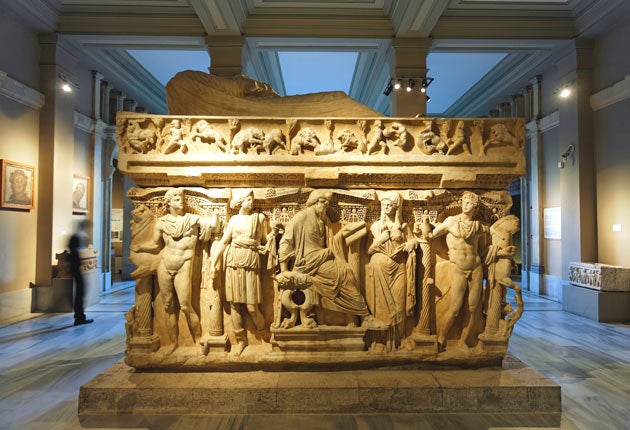Your support helps us to tell the story
From reproductive rights to climate change to Big Tech, The Independent is on the ground when the story is developing. Whether it's investigating the financials of Elon Musk's pro-Trump PAC or producing our latest documentary, 'The A Word', which shines a light on the American women fighting for reproductive rights, we know how important it is to parse out the facts from the messaging.
At such a critical moment in US history, we need reporters on the ground. Your donation allows us to keep sending journalists to speak to both sides of the story.
The Independent is trusted by Americans across the entire political spectrum. And unlike many other quality news outlets, we choose not to lock Americans out of our reporting and analysis with paywalls. We believe quality journalism should be available to everyone, paid for by those who can afford it.
Your support makes all the difference.Turkey is demanding the return of an ancient marble head, now languishing in the stores of a London museum, which was taken from Anatolia more than a century ago.
The Turkish culture ministry has asked the Victoria and Albert Museum to return a 1,700-year-old life-sized marble carving of a child's head, described as bearing a likeness to Eros, the Greek god of love.
Tolga Tuyluoglu, the director of Turkey's culture and tourism office in London, said: "The Turkish ministry of culture thinks this item belongs to Turkey. We believe if an item has been removed from a country then it should be returned to the original place."
In 1882, the archaeologist Sir Charles Wilson, then Britain's consul-general in Anatolia, removed the head from the Sidamara Sarcophagus, a huge tomb dating from the third century, which he had excavated. The sarcophagus, which now sits in Istanbul's Museum of Archaeology, is one of the finest and most widely known of its type and period.
Sir Charles, who served in the Royal Engineers, conducted archaeological surveys in Palestine and Lebanon before moving to Anatolia, which corresponds to most of present-day Turkey, in 1879. He removed the head from the Sidamara Sarcophagus, which he then re-covered in the hope of acquiring the whole object. The head is that of a child with curly hair looking over his shoulder. Sir Charles's family later donated the head to the V&A, where it is held in the museum's stores.
"It's a complicated issue," said Mr Tuyluoglu. "There are many agreements between the two countries. We are discussing the matter." The Turkish government wrote to the V&A last year, Mr Tuyluoglu said, but had still not managed to acquire the object. He said the culture ministry was "working hard" for the return of such objects but denied it had been attempting to win favour with voters ahead of the country's June general election.
The V&A's acquisition and disposal policy states that objects can be disposed of if they are "unsuitable for retention" and if their disposal will be "without detriment to the interests of students and other members of the public".
"There has been a request from the Turkish government," a V&A spokeswoman said. "As a national museum the V&A is governed by UK law on disposal of objects from the collection. However, the V&A is considering the request seriously."
A diplomatic minefield
Should Turkey's demand for the return of the missing stone head develop into the kind of row that still surrounds the Elgin marbles, it could have broad ramifications. As Turkey seeks EU membership, co-operation in the fields of art and history is seen as a key element of diplomacy, leading the British artist Mark Wallinger to be commissioned last year to create a temporary cinema for the Turkish city of Canakkale as a symbol of goodwill. "Discussions about Turkey's joining the EU are intense and can be fraught, but without a cultural dimension they lack depth," the British Council's David Codling said at the time. "The arts, in this instance, provide a forum for debate within and between countries."
Rob Hastings

Join our commenting forum
Join thought-provoking conversations, follow other Independent readers and see their replies
Comments